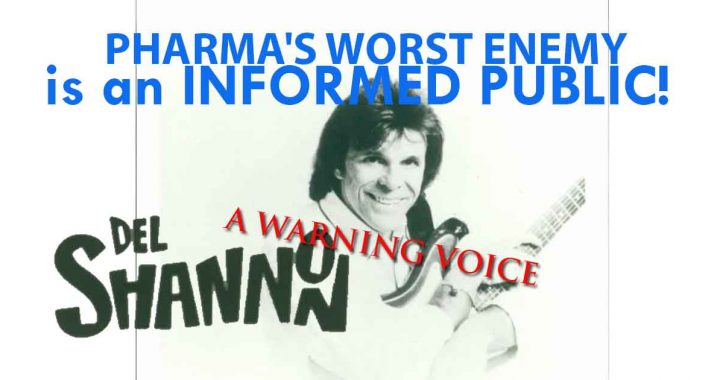![pills-28944366[1]](http://www.drugawareness.org/wp-content/uploads/pills-289443661.jpg)
For over two decades now I have focused on the serious physical health problems associated with the use of antidepressant medications. It is many of those physical side effects that cause the serious psychiatric side effects associated with the drugs. My book, Prozac: Panacea or Pandora?, first printed in 1994, documents many adverse effects which the known science behind serotonin indicated we should expect to see as a result of impairing the metabolism of serotonin (the end result of serotonin reuptake inhibitors). This Latin Times article includes many of those concerns I voiced over 20 years ago, but there are tragically even more to add to this long list. Once you understand the function of serotonin and the negative impact of inhibiting the metabolism of serotonin you can easily see what should be expected as the end result of using these drugs which is what I have long attempted to raise awareness about.
This is my posted comment on the following article: THANK YOU FOR YOUR MOST EXCELLENT ARTICLE!!! I have specialized in antidepressant adverse reactions for over 20 years & this article contains more truth about the adverse physical effects than I have seen in two decades! Although I would have added a few more adverse effects that concern me very much such as heart problems, thyroid problems, hypoglycemia, diabetes, sleep disorders, Alzheimers, fibromyalgia, MS, asthma, allergies, multiple chemical sensitivity, etc., I am grateful that you have the courage to educate your readers about the serious health effects you listed here. You deserve to be commended for this as this has become a very serious public health issue worldwide with most media appearing to be unwilling to discuss the issue!
http://www.latintimes.com/articles/932/20121106/antidepressants-cause-serious-health-effects.htm
Antidepressants may Cause Serious Health Effects
By Staff Reporter, Nov 06, 2012 07:16 AM EST
(PHOTO CREDIT: Reuters)
An estimated one in ten people suffer from depression. Antidepressants are the most widely-used drugs in the U.S., with a whopping 11 percent of Americans over the age of 12 taking them under medical supervision, reveals data from the National Health and Nutrition Examination Surveys 2005-2008.
Depression is not a situational sadness; it is a lasting and pervasive mood disorder.
However, some experts question its classification as a true disease, stating that there is no clear evidence that the “chemical imbalance” many doctors blame for the symptoms of depression, actually exist at all. This aside, many people rely on prescription drugs to treat their depression, sometimes not fully understanding the risks involved with the medication.
There are several different, widely used medications prescribed for the treatment of depression. The most common antidepressants are known as SSRIs or Selective Serotonin Reuptake Inhibitors. They work by limiting the reuptake of serotonin in the brain. This reportedly assists in the management of depression because it’s suspected that a low level of serotonin (the feel-good brain chemical) is associated with depressive symptoms. By preventing reuptake, more of the chemical is circulating in the brain. These drugs include Zoloft, Prozac, Celexa, Paxil and Lexapro.
Short term effects:
Short term effects of the drugs include dry mouth, lack of sex drive, insomnia, weight gain, loss of appetite, drowsiness, constipation, sweating, dizziness and anxiety. These effects of antidepressants are often most noticeable when a person first begins to take the prescription. As the body adjusts to the chemicals within the drug, the effects reportedly become less noticeable.
Long term effects:
Increased stroke risk: A study published in the journal Neurology indicated that patients taking SSRI drugs have a 50 percent greater chance of suffering an intra-cranial hemorrhage and a 40 percent greater risk of suffering an intra-cerebral hemorrhage when compared with people not taking antidepressants.
Birth defects and miscarriages: The FDA’s MedWatch Adverse Events Reporting System revealed that antidepressant use by pregnant women suffering from depression was responsible for more than 4,000 critical birth defects and heart defects, almost 3,000 spontaneous abortions, and 3,000 premature births. In all, antidepressants are said to increase the risk of miscarriage by 68 percent.
Suicide: Ironically, many studies have linked the use of antidepressants with an increased risk of suicide, suicide attempts and even worse, depression symptoms.
Antidepressants have also been linked to increased risk of autism in children, higher rates of breast cancer, and even bone density depletion.
A Newsweek feature story had earlier said that Studies suggest that these anti depressants are just placebos. These drugs might have helped a lot of people to cope with depression, but they are not necessarily the first choice. Psychotherapy is a better choice for moderate or severe depression.
© 2012 Latin Times. All rights reserved. Do not reproduce without permission.
About the Author: Ann Blake Tracy is the author of PROZAC: PANACEA OR PANDORA?, and the director of the International Coalition For Drug Awareness [www.drugawareness.org]. She has testified before the FDA and has testified as an expert in legal cases involving serotonergic medications since 1992.
BOOK: Prozac: Panacea or Pandora? – Our Serotonin Nightmare! Anything you ever wanted to know about antidepressants is included along with everything drug companies hope you never find out about these drugs.
BOOK TESTIMONIALS:
“Very bold & informative”
“Priceless information that is giving me back to me”
“The absolute best reference for antidepressant drugs”
“Well documented & scientifically researched”
““I was stunned at the amount of research Ann Tracy has done on this subject. Few researchers go to as much trouble aggressively gathering information on the adverse reactions of Prozac, Zoloft and other SSRIs.”
SAFE WITHDRAWAL CD “Help! I Can’t Get Off My Antidepressant!” on how to safely withdraw from antidepressants & most psychiatric medications is saving lives! Both available at www.drugawareness.org
SAFE WITHDRAWAL CD TESTIMONIALS:
“Ann, I just wanted to let you know from the bottom of my heart how grateful I am God placed you in my life. I am now down to less than 2 mg on my Cymbalta and I have never felt better. I am finally getting my life back. I can feel again and colors have never been brighter. Thanks for all that you do!!” … Amber Weber
“Used your method of weaning off of SSRI’s and applied it to Ambien. Took 6 months but had been on 15 mg for years so what was another 6 months. I have been sleeping without it for 2 weeks and it is the first time I have been able to sleep drug free for 15 years. What a relief to be able to lay down and sleep when I need or want to. Ambien may be necessary for people at times but doctors giving a months worth of it at a time with unlimited refills is a prescription for disaster. It is so damn easy to become dependent on. Thanks for your council Ann.”… Mark Hill
“I’m so thankful for AnnTracy and all her work. Also for taking the time out to talk to me and educate everyone! She has been a blessing to me during this awful time of antidepressant hell!” … Antoinette Beck




